Information Technology Ethics: Data Collection Case Study Analysis
VerifiedAdded on 2022/12/15
|6
|1412
|414
Essay
AI Summary
This essay delves into the ethical dimensions of data collection, focusing on the case study "Data collection: Harvesting personalities Online." It examines the practice of harvesting personal data from online platforms, especially for targeted political campaigns, and evaluates its morality through the lenses of four key ethical theories: utilitarianism, deontology, contract theory, and virtue ethics. The essay explores how these theories offer different perspectives on the ethicality of data collection, considering consequences, moral duties, societal agreements, and character development. The analysis reveals that while targeted advertising may have benefits, the collection of data without informed consent raises significant ethical concerns. Ultimately, the essay concludes that the practice of harvesting personal data without the individual's knowledge is unethical, particularly because it does not promote greater good within society.
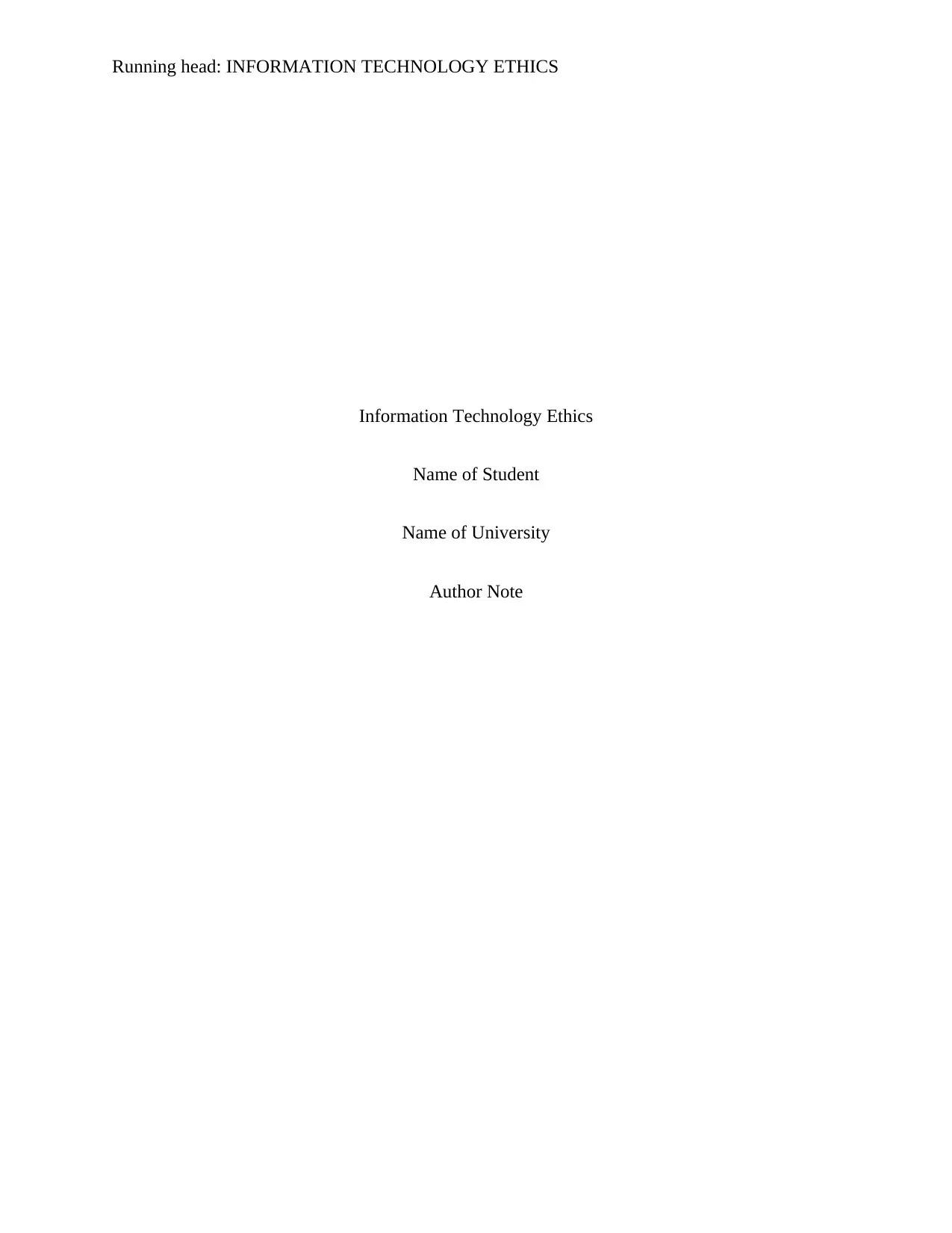
Running head: INFORMATION TECHNOLOGY ETHICS
Information Technology Ethics
Name of Student
Name of University
Author Note
Information Technology Ethics
Name of Student
Name of University
Author Note
Paraphrase This Document
Need a fresh take? Get an instant paraphrase of this document with our AI Paraphraser
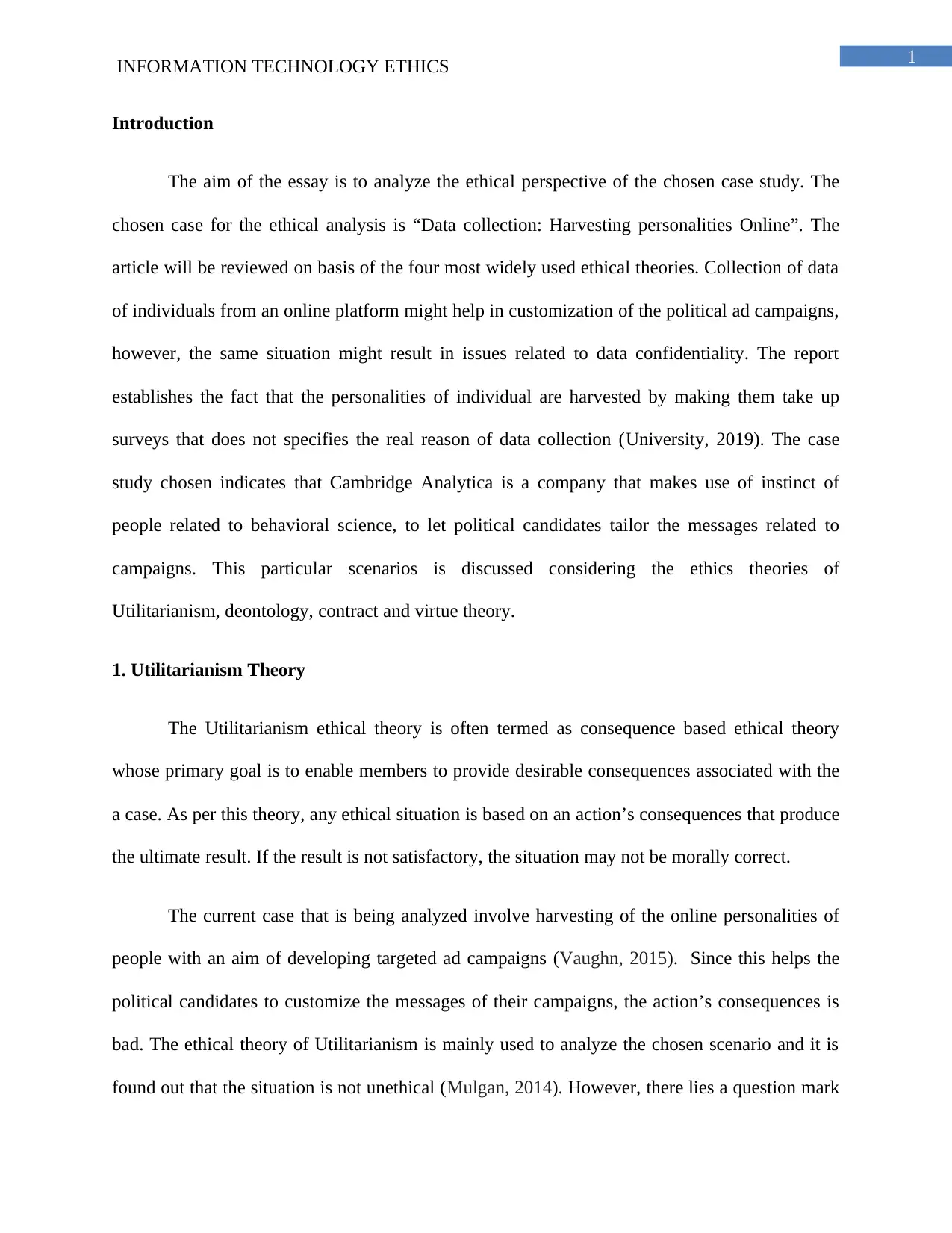
1
INFORMATION TECHNOLOGY ETHICS
Introduction
The aim of the essay is to analyze the ethical perspective of the chosen case study. The
chosen case for the ethical analysis is “Data collection: Harvesting personalities Online”. The
article will be reviewed on basis of the four most widely used ethical theories. Collection of data
of individuals from an online platform might help in customization of the political ad campaigns,
however, the same situation might result in issues related to data confidentiality. The report
establishes the fact that the personalities of individual are harvested by making them take up
surveys that does not specifies the real reason of data collection (University, 2019). The case
study chosen indicates that Cambridge Analytica is a company that makes use of instinct of
people related to behavioral science, to let political candidates tailor the messages related to
campaigns. This particular scenarios is discussed considering the ethics theories of
Utilitarianism, deontology, contract and virtue theory.
1. Utilitarianism Theory
The Utilitarianism ethical theory is often termed as consequence based ethical theory
whose primary goal is to enable members to provide desirable consequences associated with the
a case. As per this theory, any ethical situation is based on an action’s consequences that produce
the ultimate result. If the result is not satisfactory, the situation may not be morally correct.
The current case that is being analyzed involve harvesting of the online personalities of
people with an aim of developing targeted ad campaigns (Vaughn, 2015). Since this helps the
political candidates to customize the messages of their campaigns, the action’s consequences is
bad. The ethical theory of Utilitarianism is mainly used to analyze the chosen scenario and it is
found out that the situation is not unethical (Mulgan, 2014). However, there lies a question mark
INFORMATION TECHNOLOGY ETHICS
Introduction
The aim of the essay is to analyze the ethical perspective of the chosen case study. The
chosen case for the ethical analysis is “Data collection: Harvesting personalities Online”. The
article will be reviewed on basis of the four most widely used ethical theories. Collection of data
of individuals from an online platform might help in customization of the political ad campaigns,
however, the same situation might result in issues related to data confidentiality. The report
establishes the fact that the personalities of individual are harvested by making them take up
surveys that does not specifies the real reason of data collection (University, 2019). The case
study chosen indicates that Cambridge Analytica is a company that makes use of instinct of
people related to behavioral science, to let political candidates tailor the messages related to
campaigns. This particular scenarios is discussed considering the ethics theories of
Utilitarianism, deontology, contract and virtue theory.
1. Utilitarianism Theory
The Utilitarianism ethical theory is often termed as consequence based ethical theory
whose primary goal is to enable members to provide desirable consequences associated with the
a case. As per this theory, any ethical situation is based on an action’s consequences that produce
the ultimate result. If the result is not satisfactory, the situation may not be morally correct.
The current case that is being analyzed involve harvesting of the online personalities of
people with an aim of developing targeted ad campaigns (Vaughn, 2015). Since this helps the
political candidates to customize the messages of their campaigns, the action’s consequences is
bad. The ethical theory of Utilitarianism is mainly used to analyze the chosen scenario and it is
found out that the situation is not unethical (Mulgan, 2014). However, there lies a question mark
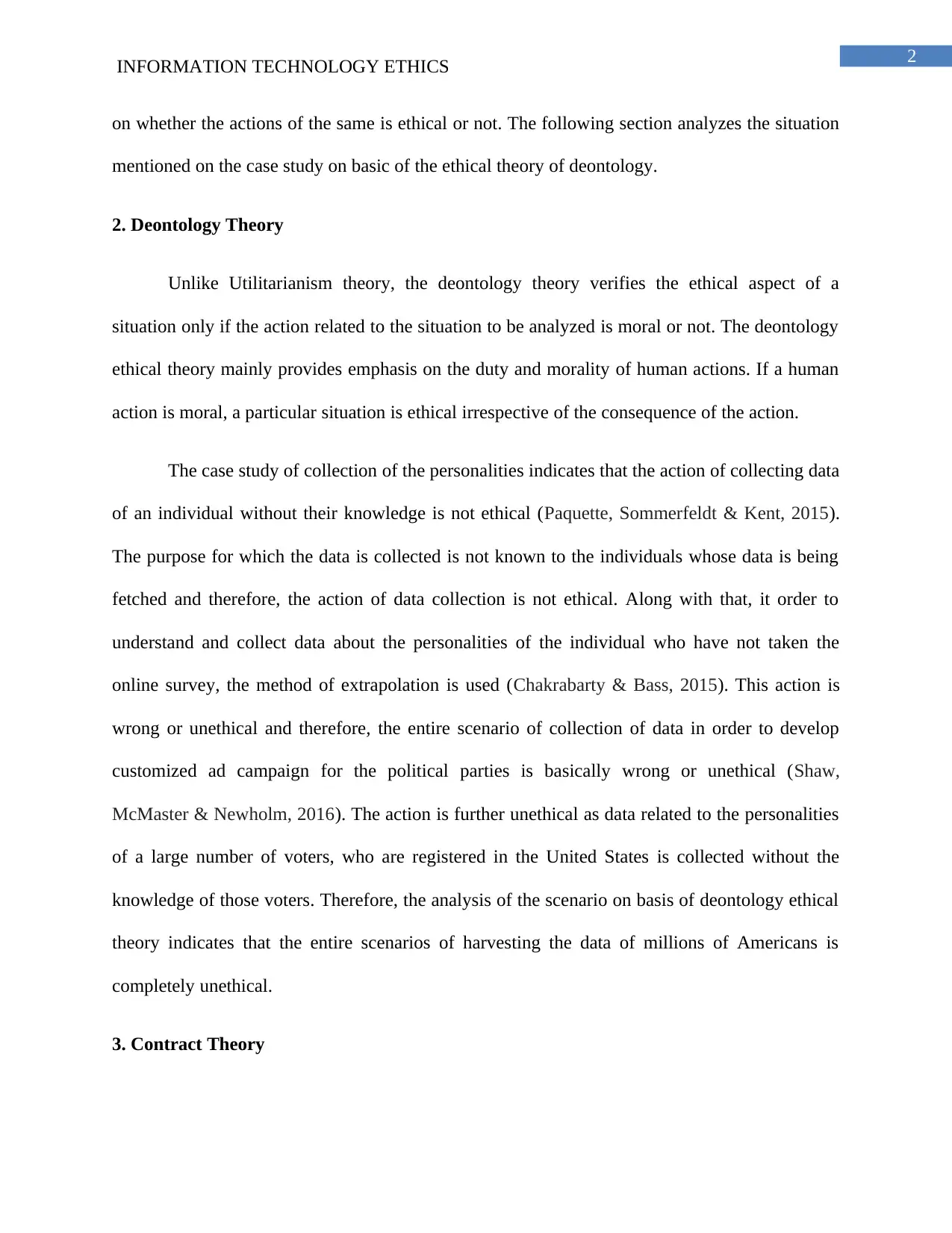
2
INFORMATION TECHNOLOGY ETHICS
on whether the actions of the same is ethical or not. The following section analyzes the situation
mentioned on the case study on basic of the ethical theory of deontology.
2. Deontology Theory
Unlike Utilitarianism theory, the deontology theory verifies the ethical aspect of a
situation only if the action related to the situation to be analyzed is moral or not. The deontology
ethical theory mainly provides emphasis on the duty and morality of human actions. If a human
action is moral, a particular situation is ethical irrespective of the consequence of the action.
The case study of collection of the personalities indicates that the action of collecting data
of an individual without their knowledge is not ethical (Paquette, Sommerfeldt & Kent, 2015).
The purpose for which the data is collected is not known to the individuals whose data is being
fetched and therefore, the action of data collection is not ethical. Along with that, it order to
understand and collect data about the personalities of the individual who have not taken the
online survey, the method of extrapolation is used (Chakrabarty & Bass, 2015). This action is
wrong or unethical and therefore, the entire scenario of collection of data in order to develop
customized ad campaign for the political parties is basically wrong or unethical (Shaw,
McMaster & Newholm, 2016). The action is further unethical as data related to the personalities
of a large number of voters, who are registered in the United States is collected without the
knowledge of those voters. Therefore, the analysis of the scenario on basis of deontology ethical
theory indicates that the entire scenarios of harvesting the data of millions of Americans is
completely unethical.
3. Contract Theory
INFORMATION TECHNOLOGY ETHICS
on whether the actions of the same is ethical or not. The following section analyzes the situation
mentioned on the case study on basic of the ethical theory of deontology.
2. Deontology Theory
Unlike Utilitarianism theory, the deontology theory verifies the ethical aspect of a
situation only if the action related to the situation to be analyzed is moral or not. The deontology
ethical theory mainly provides emphasis on the duty and morality of human actions. If a human
action is moral, a particular situation is ethical irrespective of the consequence of the action.
The case study of collection of the personalities indicates that the action of collecting data
of an individual without their knowledge is not ethical (Paquette, Sommerfeldt & Kent, 2015).
The purpose for which the data is collected is not known to the individuals whose data is being
fetched and therefore, the action of data collection is not ethical. Along with that, it order to
understand and collect data about the personalities of the individual who have not taken the
online survey, the method of extrapolation is used (Chakrabarty & Bass, 2015). This action is
wrong or unethical and therefore, the entire scenario of collection of data in order to develop
customized ad campaign for the political parties is basically wrong or unethical (Shaw,
McMaster & Newholm, 2016). The action is further unethical as data related to the personalities
of a large number of voters, who are registered in the United States is collected without the
knowledge of those voters. Therefore, the analysis of the scenario on basis of deontology ethical
theory indicates that the entire scenarios of harvesting the data of millions of Americans is
completely unethical.
3. Contract Theory
⊘ This is a preview!⊘
Do you want full access?
Subscribe today to unlock all pages.

Trusted by 1+ million students worldwide
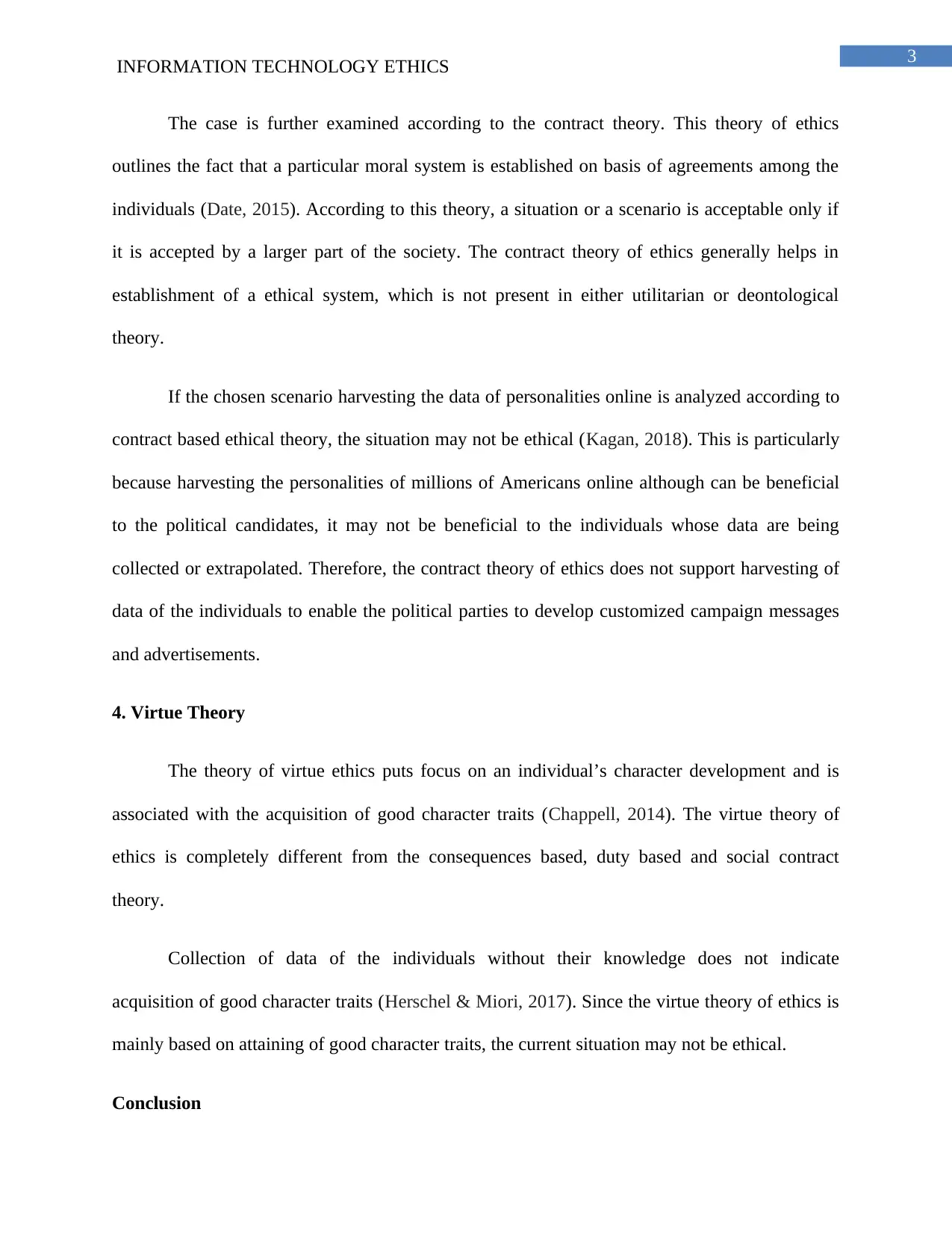
3
INFORMATION TECHNOLOGY ETHICS
The case is further examined according to the contract theory. This theory of ethics
outlines the fact that a particular moral system is established on basis of agreements among the
individuals (Date, 2015). According to this theory, a situation or a scenario is acceptable only if
it is accepted by a larger part of the society. The contract theory of ethics generally helps in
establishment of a ethical system, which is not present in either utilitarian or deontological
theory.
If the chosen scenario harvesting the data of personalities online is analyzed according to
contract based ethical theory, the situation may not be ethical (Kagan, 2018). This is particularly
because harvesting the personalities of millions of Americans online although can be beneficial
to the political candidates, it may not be beneficial to the individuals whose data are being
collected or extrapolated. Therefore, the contract theory of ethics does not support harvesting of
data of the individuals to enable the political parties to develop customized campaign messages
and advertisements.
4. Virtue Theory
The theory of virtue ethics puts focus on an individual’s character development and is
associated with the acquisition of good character traits (Chappell, 2014). The virtue theory of
ethics is completely different from the consequences based, duty based and social contract
theory.
Collection of data of the individuals without their knowledge does not indicate
acquisition of good character traits (Herschel & Miori, 2017). Since the virtue theory of ethics is
mainly based on attaining of good character traits, the current situation may not be ethical.
Conclusion
INFORMATION TECHNOLOGY ETHICS
The case is further examined according to the contract theory. This theory of ethics
outlines the fact that a particular moral system is established on basis of agreements among the
individuals (Date, 2015). According to this theory, a situation or a scenario is acceptable only if
it is accepted by a larger part of the society. The contract theory of ethics generally helps in
establishment of a ethical system, which is not present in either utilitarian or deontological
theory.
If the chosen scenario harvesting the data of personalities online is analyzed according to
contract based ethical theory, the situation may not be ethical (Kagan, 2018). This is particularly
because harvesting the personalities of millions of Americans online although can be beneficial
to the political candidates, it may not be beneficial to the individuals whose data are being
collected or extrapolated. Therefore, the contract theory of ethics does not support harvesting of
data of the individuals to enable the political parties to develop customized campaign messages
and advertisements.
4. Virtue Theory
The theory of virtue ethics puts focus on an individual’s character development and is
associated with the acquisition of good character traits (Chappell, 2014). The virtue theory of
ethics is completely different from the consequences based, duty based and social contract
theory.
Collection of data of the individuals without their knowledge does not indicate
acquisition of good character traits (Herschel & Miori, 2017). Since the virtue theory of ethics is
mainly based on attaining of good character traits, the current situation may not be ethical.
Conclusion
Paraphrase This Document
Need a fresh take? Get an instant paraphrase of this document with our AI Paraphraser
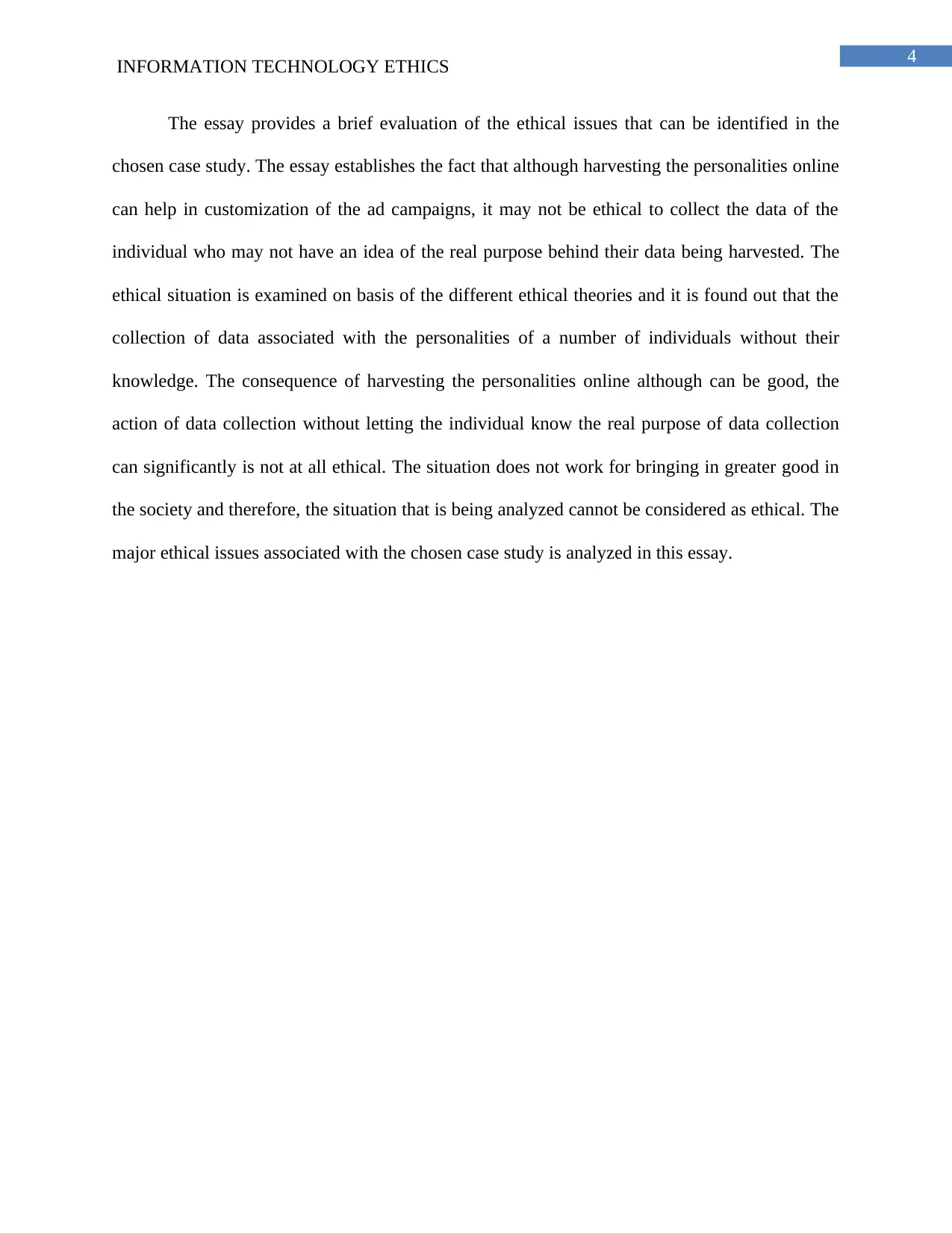
4
INFORMATION TECHNOLOGY ETHICS
The essay provides a brief evaluation of the ethical issues that can be identified in the
chosen case study. The essay establishes the fact that although harvesting the personalities online
can help in customization of the ad campaigns, it may not be ethical to collect the data of the
individual who may not have an idea of the real purpose behind their data being harvested. The
ethical situation is examined on basis of the different ethical theories and it is found out that the
collection of data associated with the personalities of a number of individuals without their
knowledge. The consequence of harvesting the personalities online although can be good, the
action of data collection without letting the individual know the real purpose of data collection
can significantly is not at all ethical. The situation does not work for bringing in greater good in
the society and therefore, the situation that is being analyzed cannot be considered as ethical. The
major ethical issues associated with the chosen case study is analyzed in this essay.
INFORMATION TECHNOLOGY ETHICS
The essay provides a brief evaluation of the ethical issues that can be identified in the
chosen case study. The essay establishes the fact that although harvesting the personalities online
can help in customization of the ad campaigns, it may not be ethical to collect the data of the
individual who may not have an idea of the real purpose behind their data being harvested. The
ethical situation is examined on basis of the different ethical theories and it is found out that the
collection of data associated with the personalities of a number of individuals without their
knowledge. The consequence of harvesting the personalities online although can be good, the
action of data collection without letting the individual know the real purpose of data collection
can significantly is not at all ethical. The situation does not work for bringing in greater good in
the society and therefore, the situation that is being analyzed cannot be considered as ethical. The
major ethical issues associated with the chosen case study is analyzed in this essay.
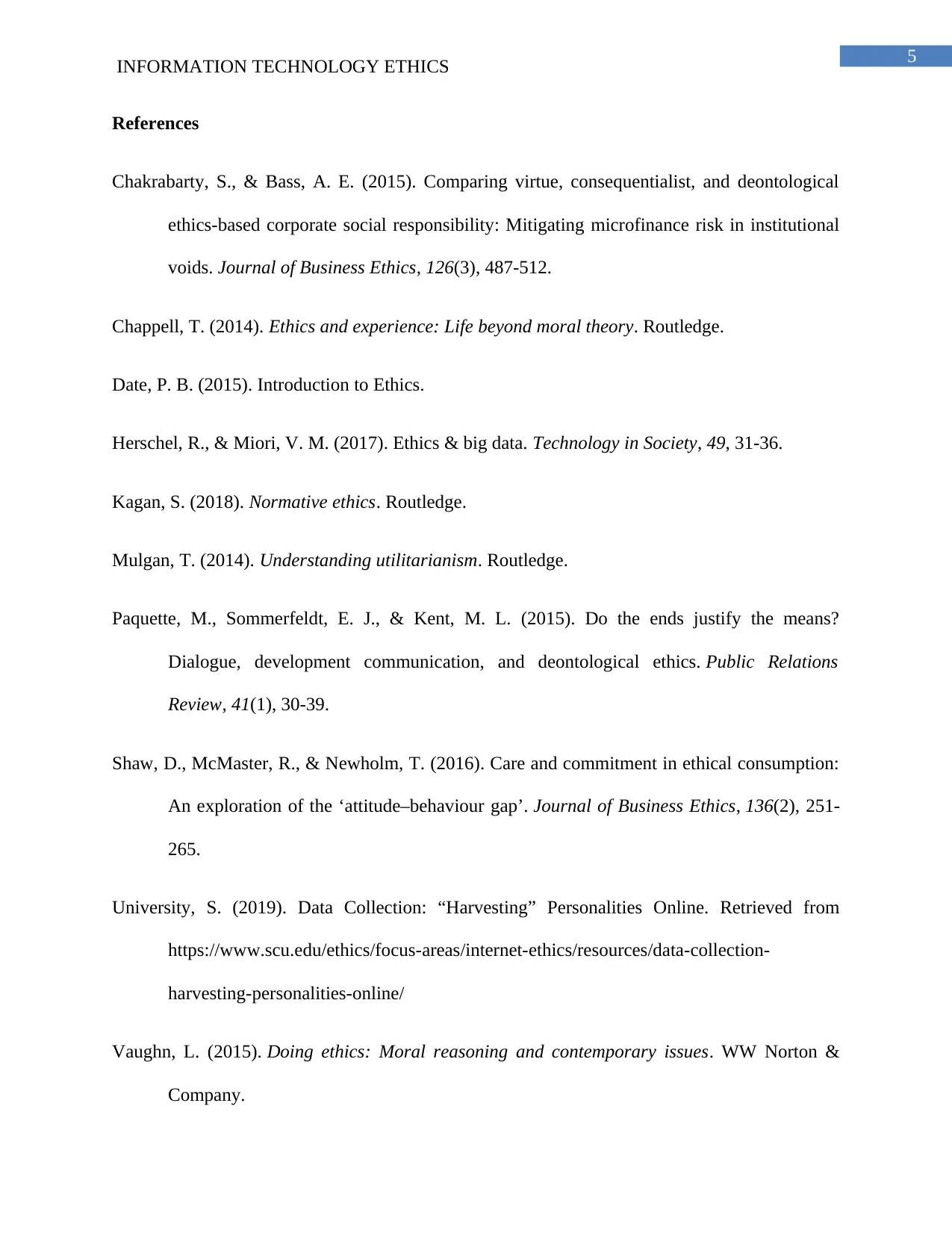
5
INFORMATION TECHNOLOGY ETHICS
References
Chakrabarty, S., & Bass, A. E. (2015). Comparing virtue, consequentialist, and deontological
ethics-based corporate social responsibility: Mitigating microfinance risk in institutional
voids. Journal of Business Ethics, 126(3), 487-512.
Chappell, T. (2014). Ethics and experience: Life beyond moral theory. Routledge.
Date, P. B. (2015). Introduction to Ethics.
Herschel, R., & Miori, V. M. (2017). Ethics & big data. Technology in Society, 49, 31-36.
Kagan, S. (2018). Normative ethics. Routledge.
Mulgan, T. (2014). Understanding utilitarianism. Routledge.
Paquette, M., Sommerfeldt, E. J., & Kent, M. L. (2015). Do the ends justify the means?
Dialogue, development communication, and deontological ethics. Public Relations
Review, 41(1), 30-39.
Shaw, D., McMaster, R., & Newholm, T. (2016). Care and commitment in ethical consumption:
An exploration of the ‘attitude–behaviour gap’. Journal of Business Ethics, 136(2), 251-
265.
University, S. (2019). Data Collection: “Harvesting” Personalities Online. Retrieved from
https://www.scu.edu/ethics/focus-areas/internet-ethics/resources/data-collection-
harvesting-personalities-online/
Vaughn, L. (2015). Doing ethics: Moral reasoning and contemporary issues. WW Norton &
Company.
INFORMATION TECHNOLOGY ETHICS
References
Chakrabarty, S., & Bass, A. E. (2015). Comparing virtue, consequentialist, and deontological
ethics-based corporate social responsibility: Mitigating microfinance risk in institutional
voids. Journal of Business Ethics, 126(3), 487-512.
Chappell, T. (2014). Ethics and experience: Life beyond moral theory. Routledge.
Date, P. B. (2015). Introduction to Ethics.
Herschel, R., & Miori, V. M. (2017). Ethics & big data. Technology in Society, 49, 31-36.
Kagan, S. (2018). Normative ethics. Routledge.
Mulgan, T. (2014). Understanding utilitarianism. Routledge.
Paquette, M., Sommerfeldt, E. J., & Kent, M. L. (2015). Do the ends justify the means?
Dialogue, development communication, and deontological ethics. Public Relations
Review, 41(1), 30-39.
Shaw, D., McMaster, R., & Newholm, T. (2016). Care and commitment in ethical consumption:
An exploration of the ‘attitude–behaviour gap’. Journal of Business Ethics, 136(2), 251-
265.
University, S. (2019). Data Collection: “Harvesting” Personalities Online. Retrieved from
https://www.scu.edu/ethics/focus-areas/internet-ethics/resources/data-collection-
harvesting-personalities-online/
Vaughn, L. (2015). Doing ethics: Moral reasoning and contemporary issues. WW Norton &
Company.
⊘ This is a preview!⊘
Do you want full access?
Subscribe today to unlock all pages.

Trusted by 1+ million students worldwide
1 out of 6
Related Documents
Your All-in-One AI-Powered Toolkit for Academic Success.
+13062052269
info@desklib.com
Available 24*7 on WhatsApp / Email
![[object Object]](/_next/static/media/star-bottom.7253800d.svg)
Unlock your academic potential
Copyright © 2020–2026 A2Z Services. All Rights Reserved. Developed and managed by ZUCOL.





